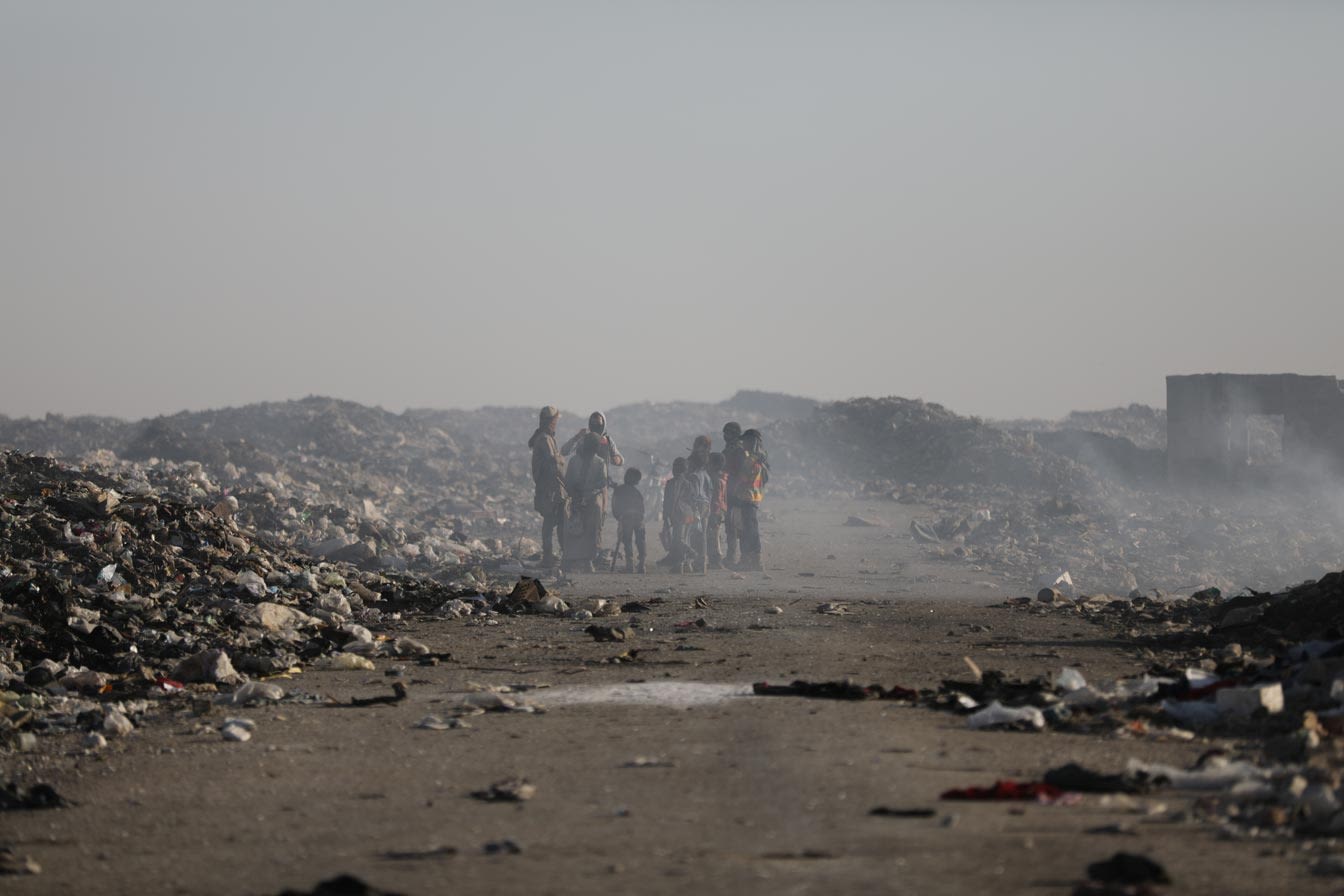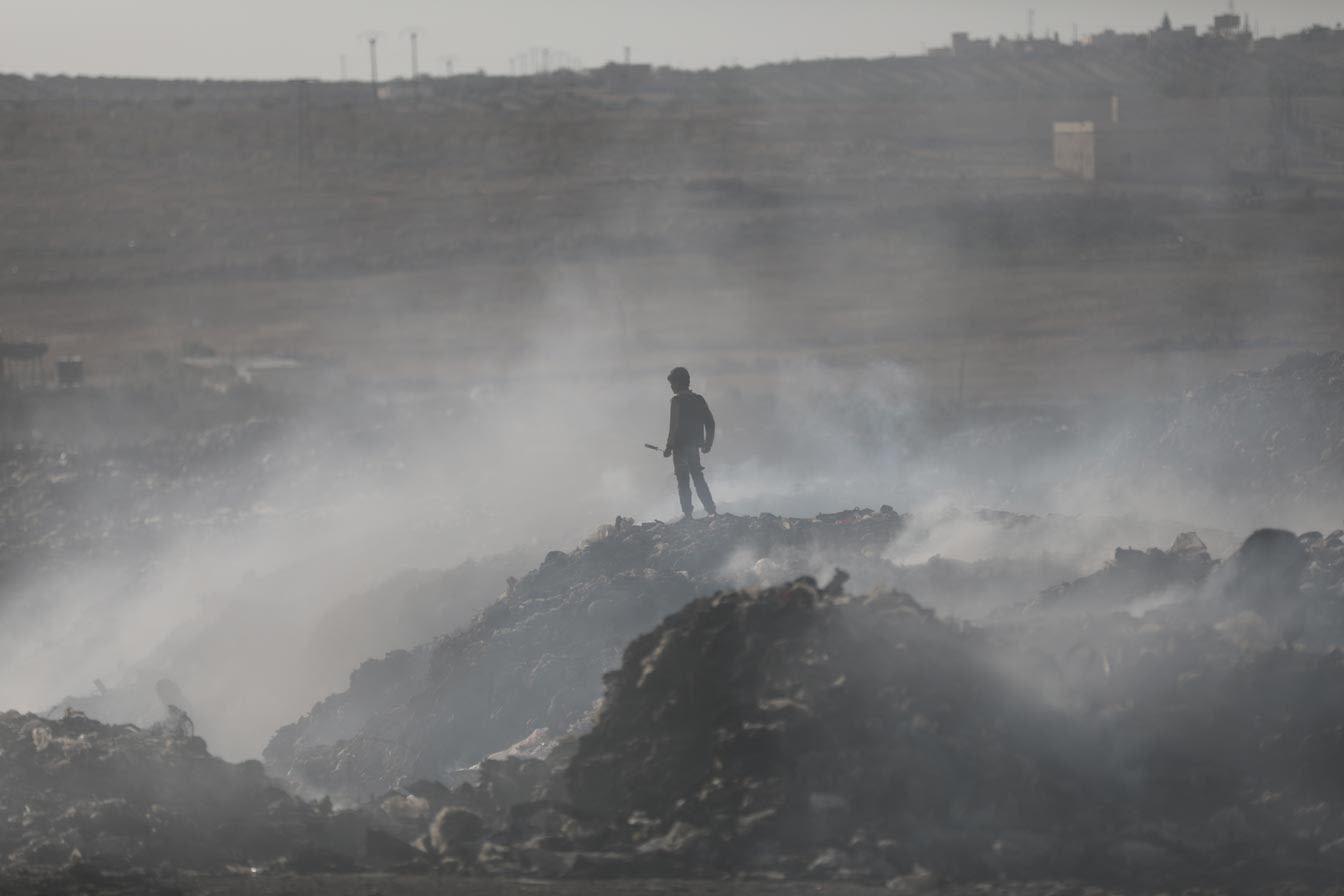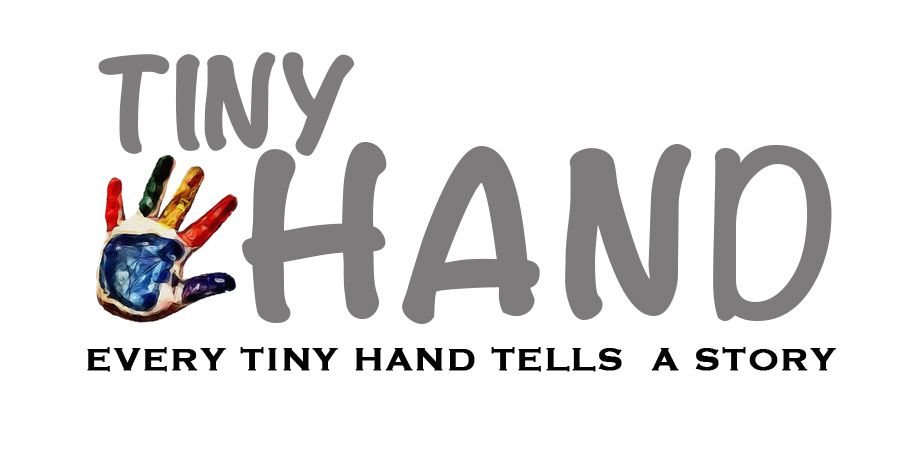A Kid-Run Landfill
Governed by Totally Different Rules
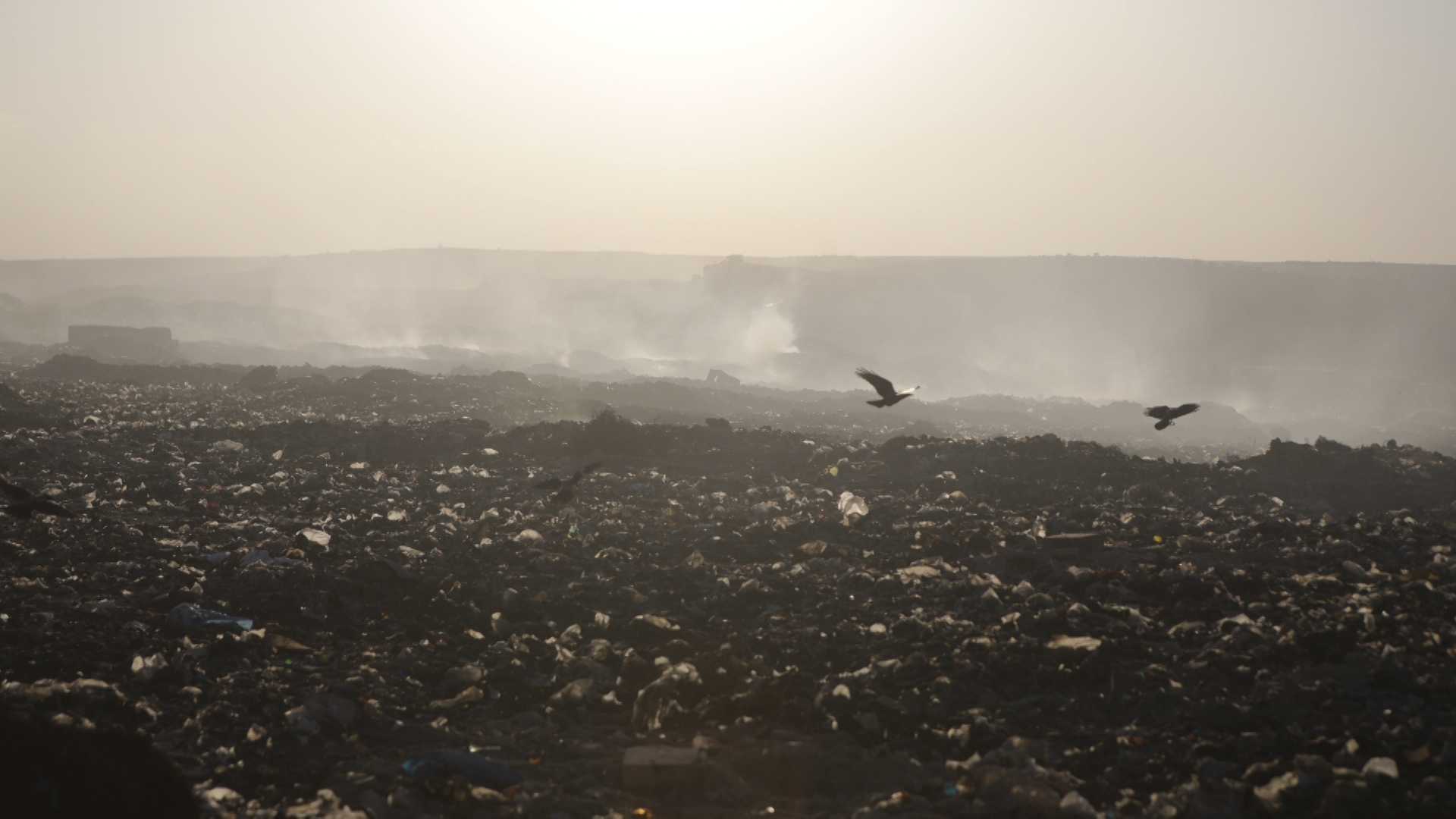
The landfill receives waste for free. The kids running it get money in exchange for collecting waste and selling it.
To cut a long story short, this business community is governed by particular rules under the “money-for-garbage” slogan.
The landfill is operated by kids
They are working in every corner in the landfill
as far as the eye could see
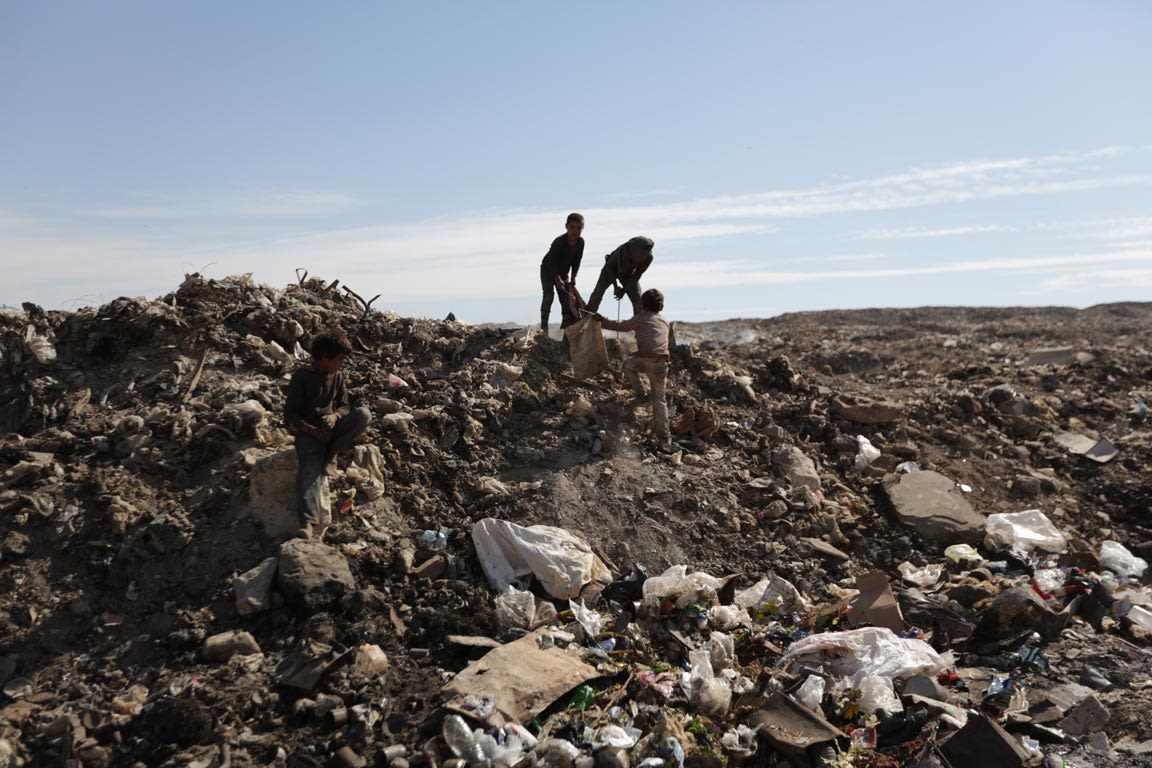
It only takes a few minutes after the sun rises for the abandoned landfill to turn into the most crowded area in northern Syria, and in Al-Bab city in particular
The dull color marking the landfill will gradually change into multiple different colors as soon as the kids scatter all over the place.
Around 30 kids set out on their journey on a daily basis looking for aluminum, plastic and cooper materials; or more precisely hunting for their dusty “treasure” which is as dirty as the clothes they wear.
Each kid carries a sickle (an iron tool with a curved blade) in his hand.
Some of them have their faces covered with pieces of cloth and most of them prefer not to wear them because they make it difficult to talk with friends during this “Find-the-Valuable-Waste” game.
Sa’eed, a 10-year-old boy, is one of the workers in Al-Bab landfill. Every day, he meets his two friends early in the morning at his tent and the three of them go for work.
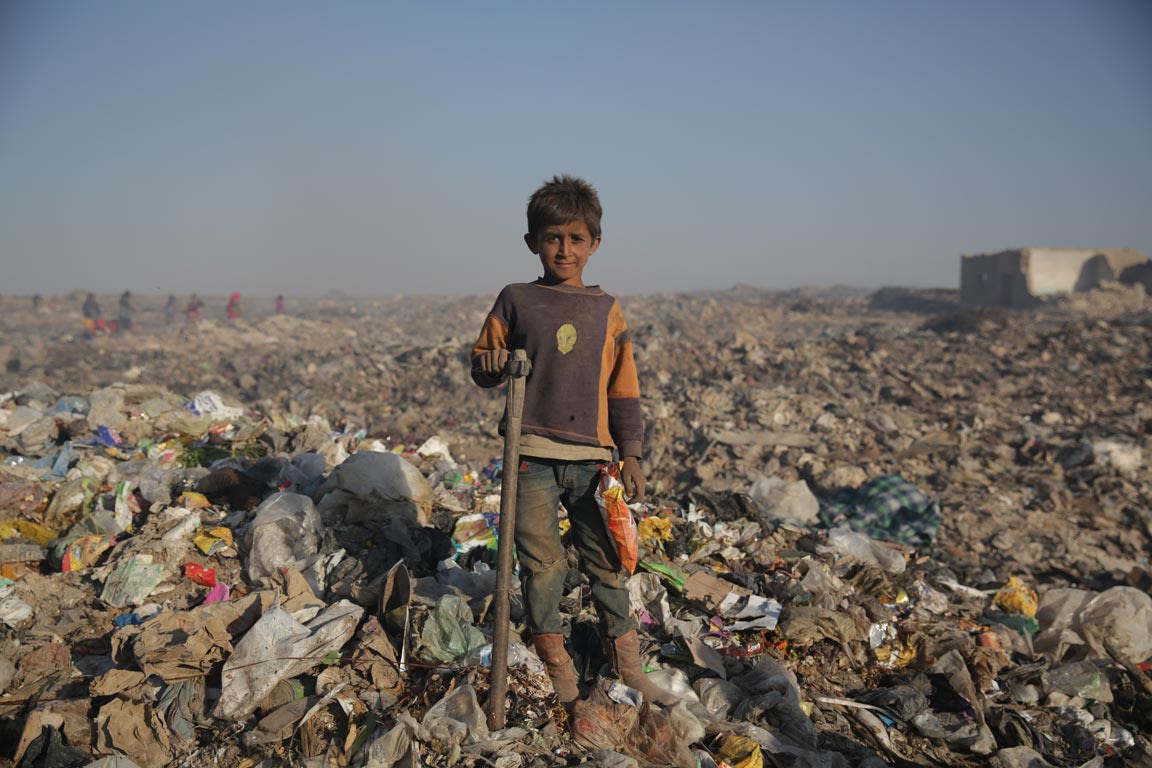
Sa’eed/ 10-year
Sa’eed/ 10-year
Their houses are not located far from the landfill; they are very close since their families had set up their tents close to the dump.
Forty people, who moved away from eastern and southern Aleppo countryside, reside close to the landfill where they set up 10 tents.
For them, this place is the shelter where they can live after they had lost everything due to the ongoing war in Syria.
Most importantly, this place is their livelihood from which they can generate income.
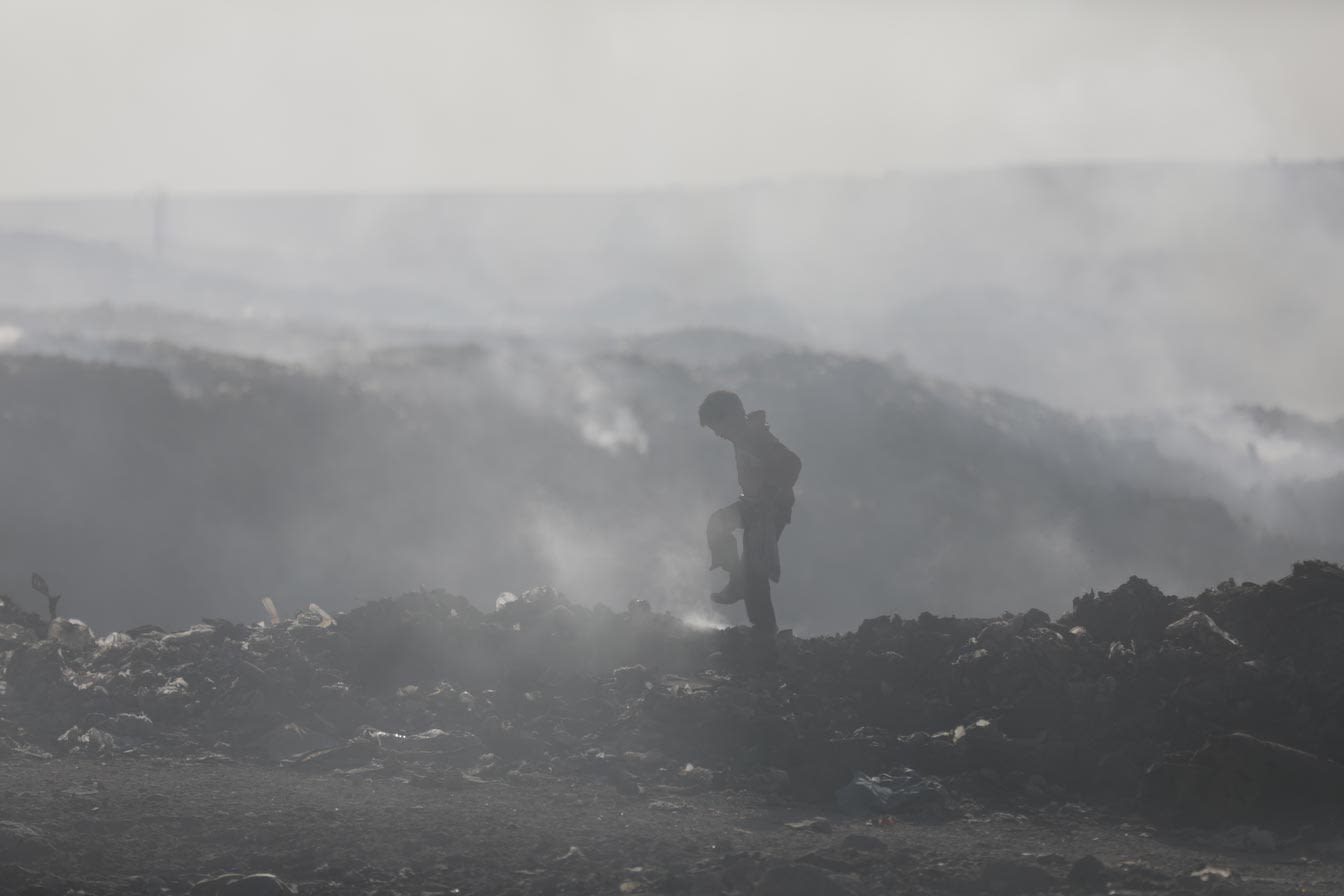
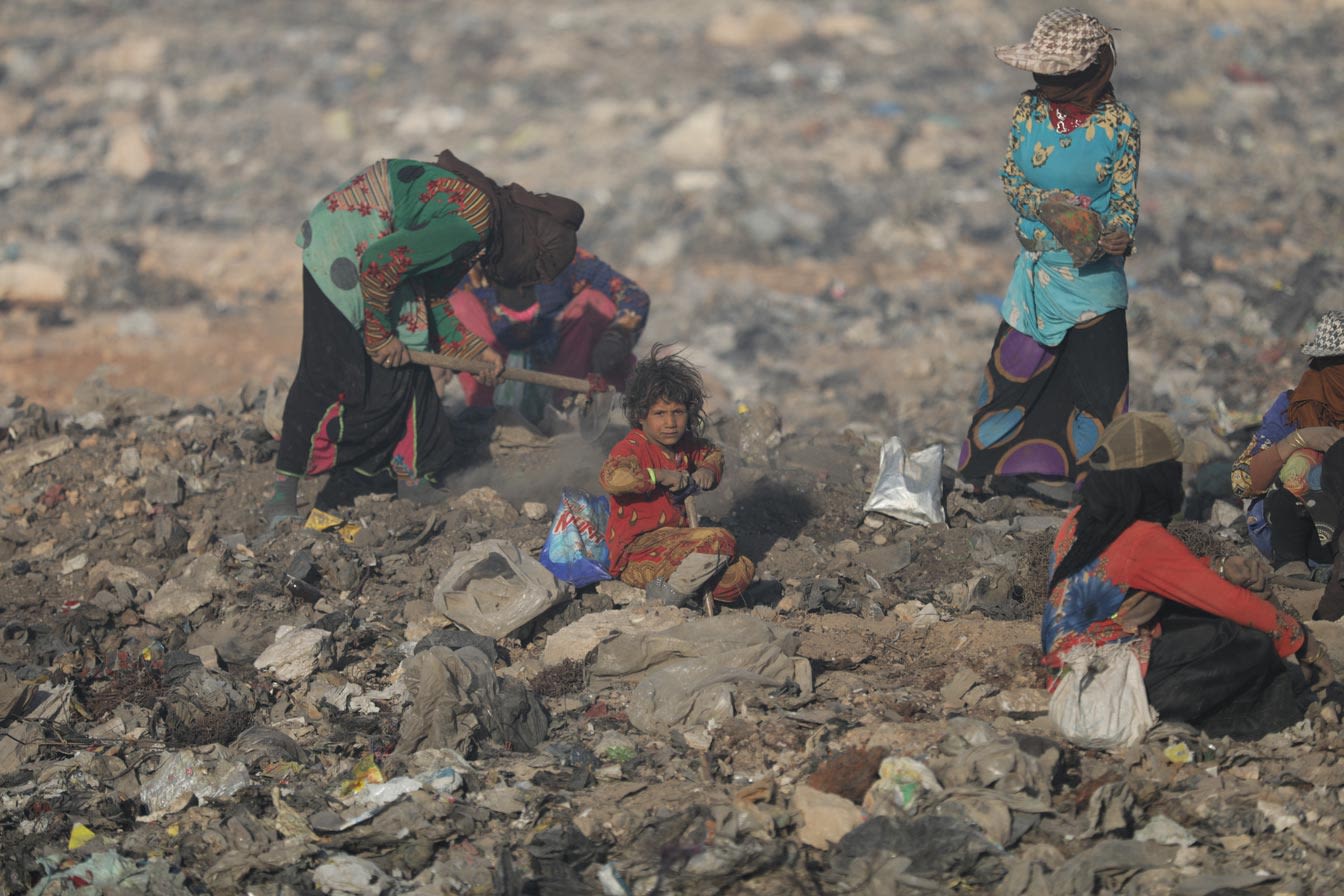
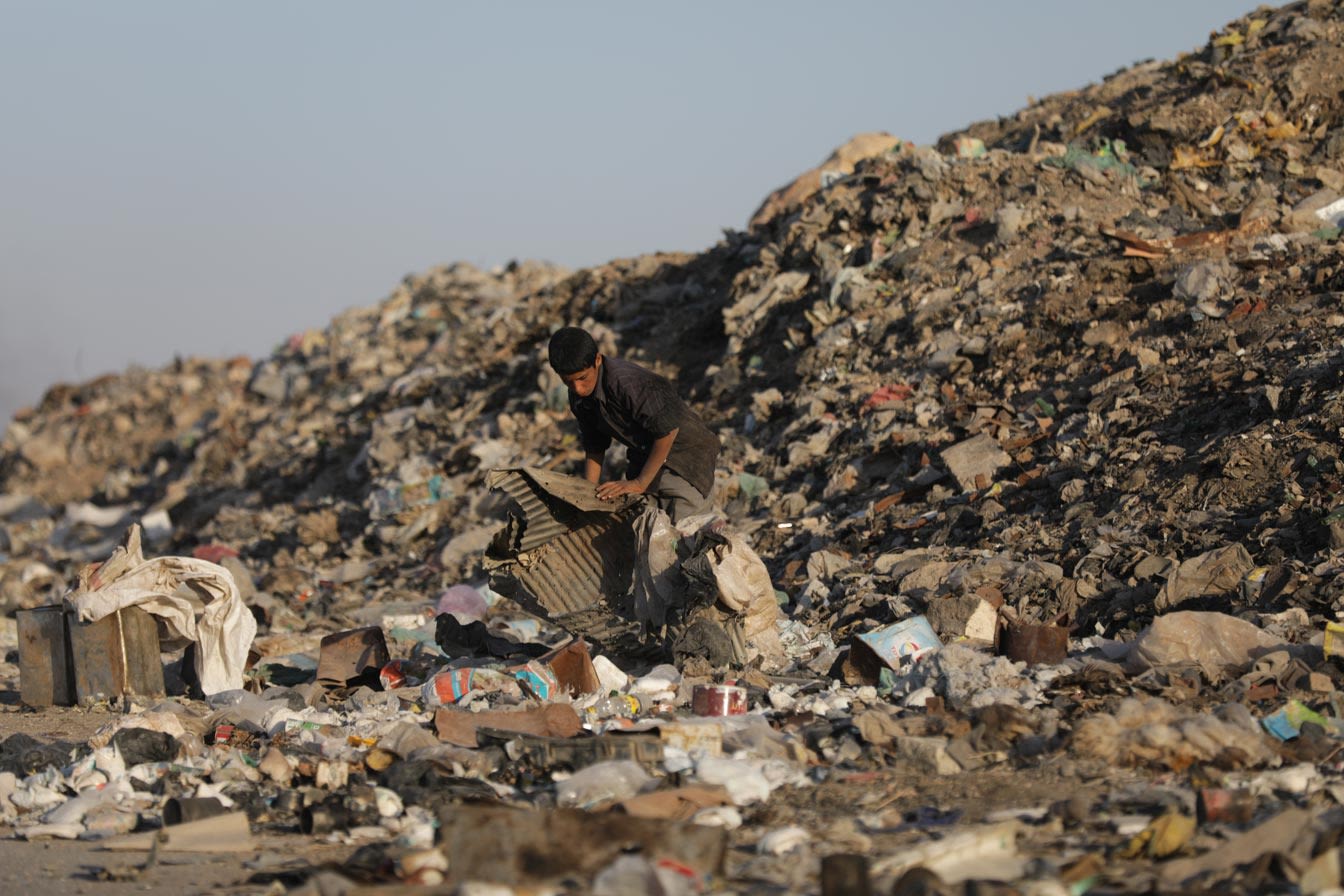
Do you catch this smell?
Then, welcome to the largest landfill in northern Syria!
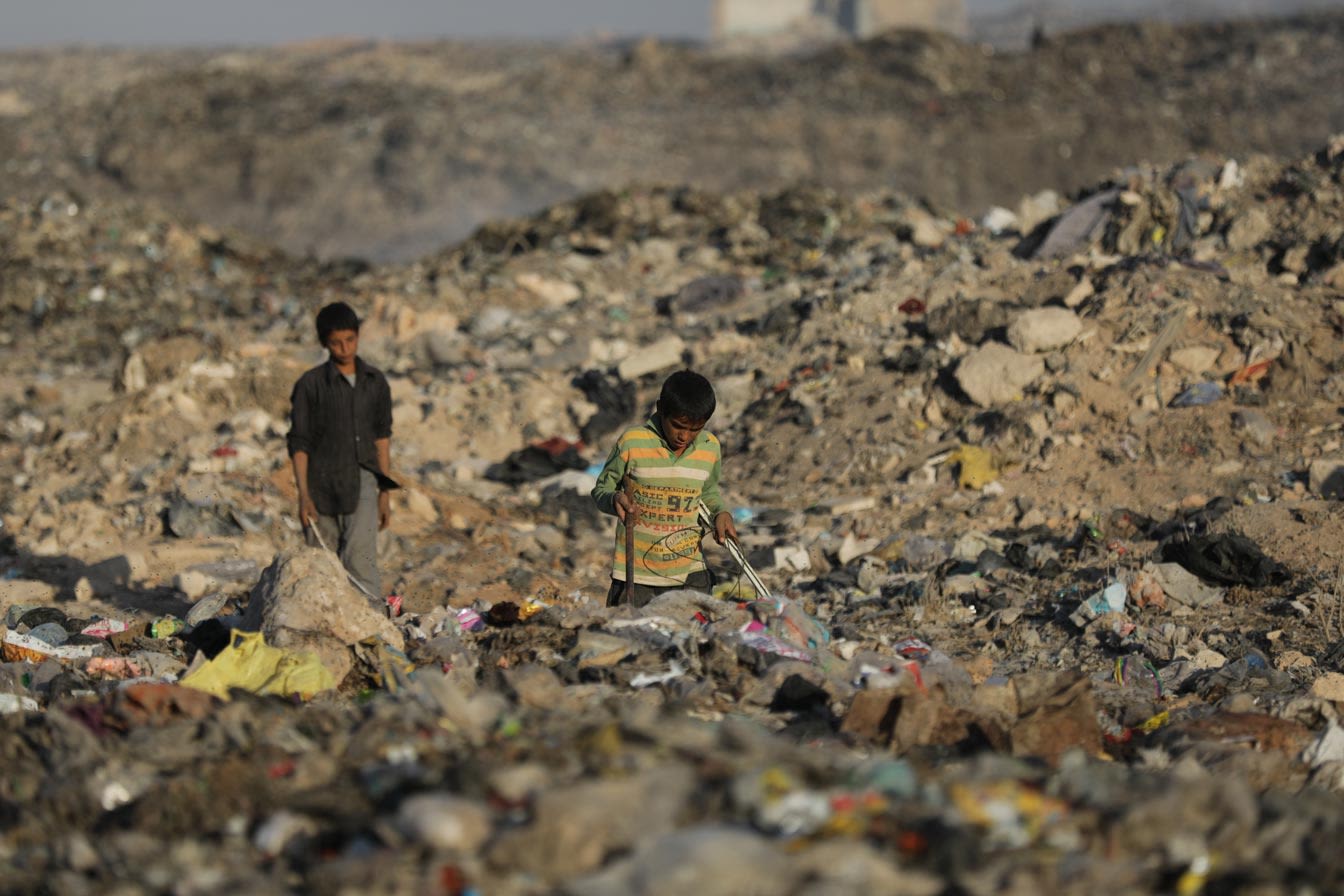
Currently controlled by the Syrian opposition, the landfill is a state-owned land and the property of the Syrian regime.
Over time, this 1-square-killometer piece of land was turned into a landfill after becoming unsuitable for agriculture.
Whoever looks at such a vast area would be unable to identify its actual size because it seems endless with piles and mountains of waste materials are scattered as far as the eye could see. The nasty smell never abandons the dump.
The closer one gets to the place, the sharper is the nasty smell caught by their noses even with tens of kilometers separating between them and the landfill.
It only takes you a second to be feel that this smell will get into your nostrils and stay there forever; indeed, it is both overpowering and pungent.
The evacuees residing nearby have come up with a solution for this offensive odor; that is, they set up their tents on the north and west sides of the landfill so that wind can blow up the odor in the reverse direction, away from the tents.
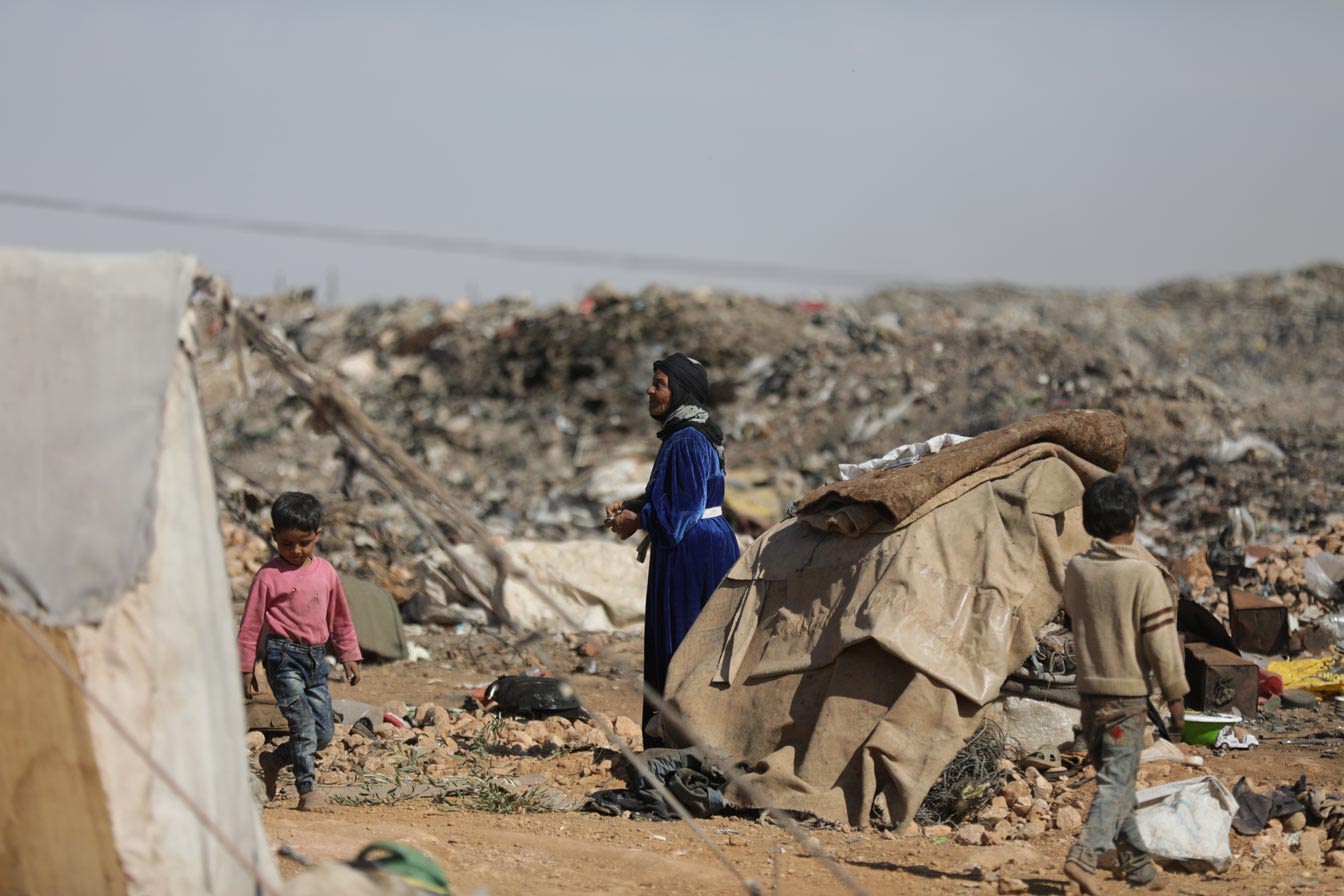
The quantity of waste being brought to the landfill increases day by day, with the place being a central dump for “Al-Bab city, Al-Ra’yi, and the neighboring villages such as Akhtarin, Susinbat, Al-Numan, Sosyan, Aulan, and Hezwan” and each and every corner of such areas are controlled by the Syrian pro-opposition factions.
Garbage trucks collect the waste from these areas and transport it to the landfill where the kids are waiting to start searching for something of value.
The luckiest kid is
The one who finds cooper, the most precious of all waste materials
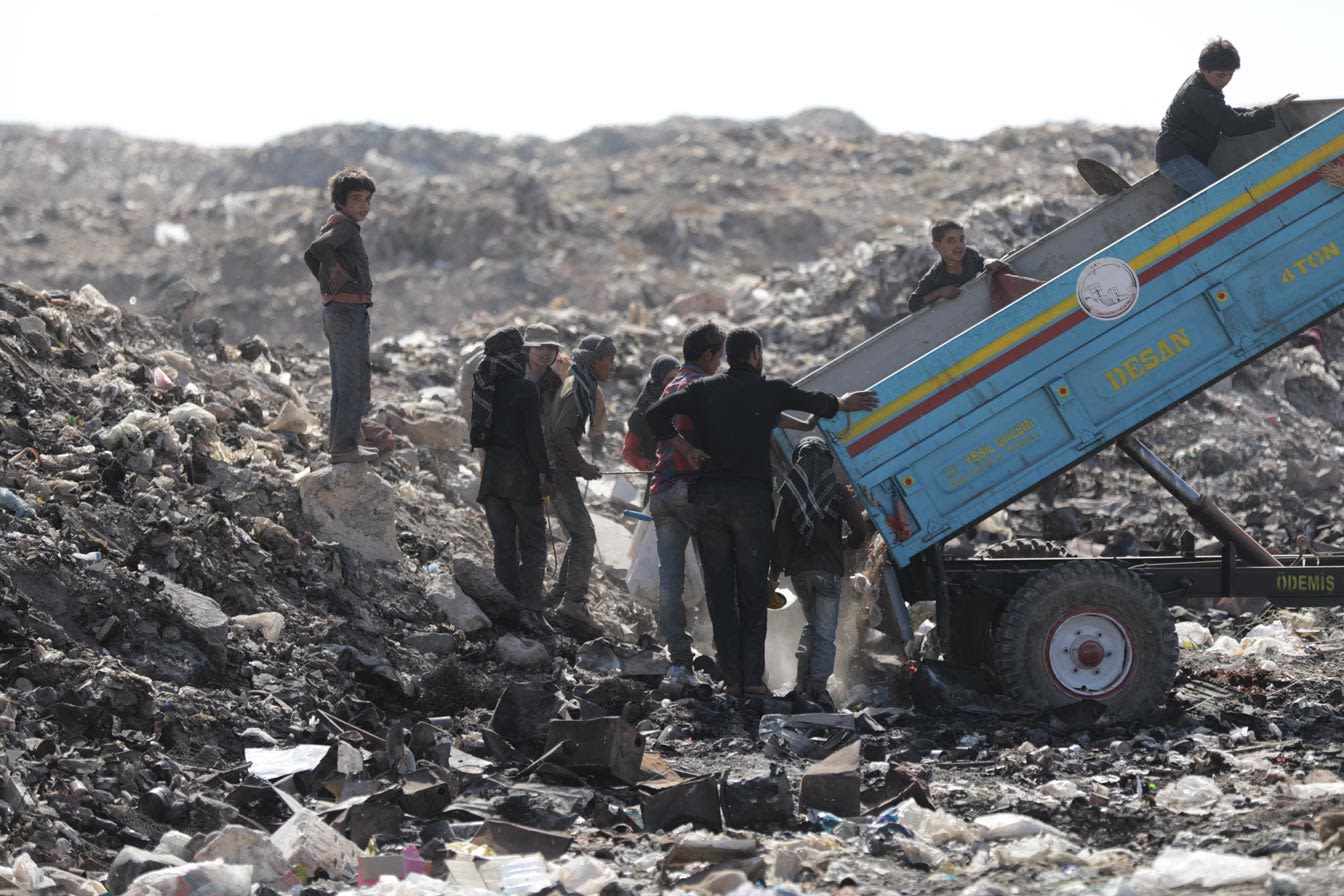
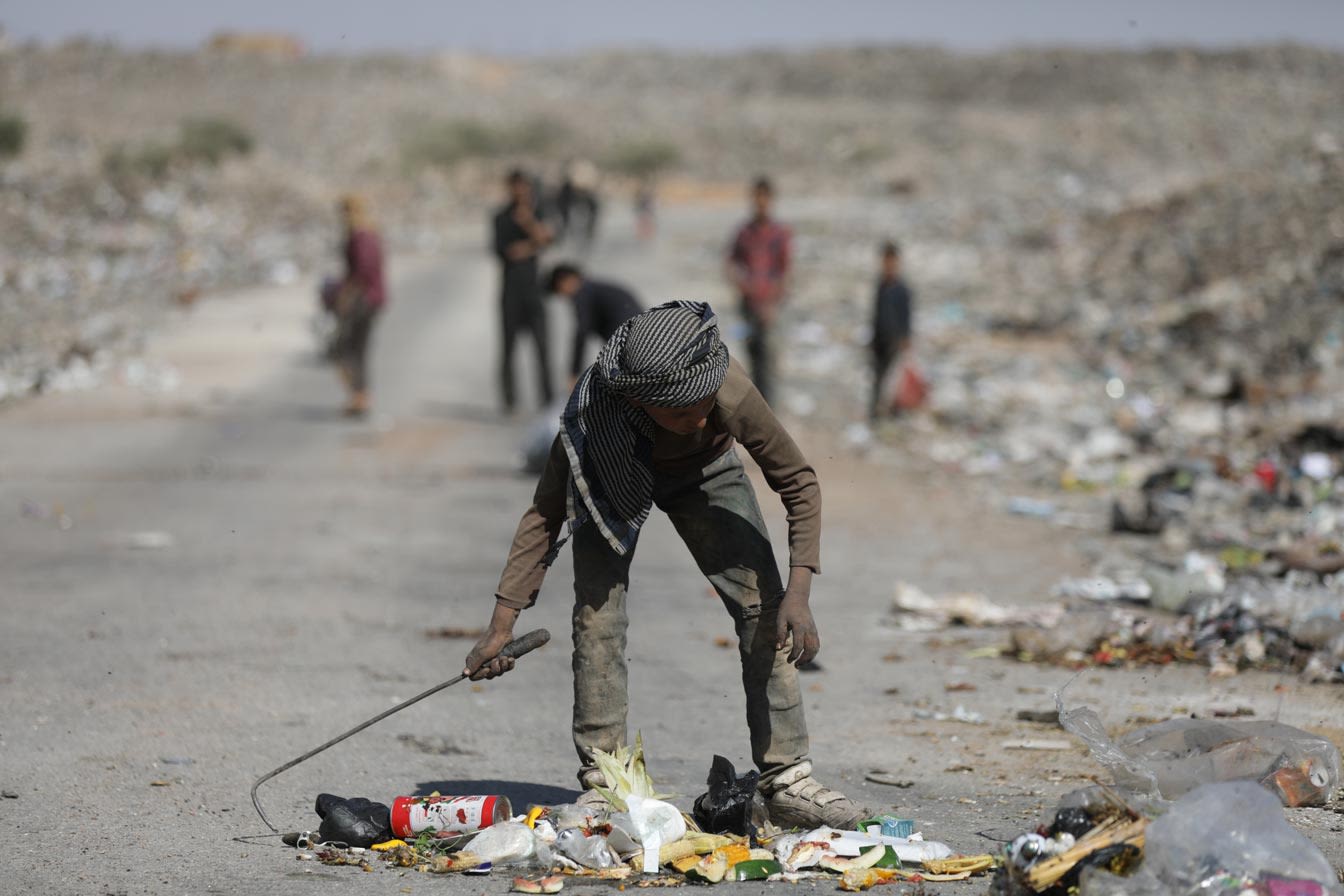
It is almost 12 pm. This means Sa’eed has been working over more than 6 hours finding nothing valuable to sell up till the moment.
He seemed distracted with his eyes gazing at the main road. Once he caught sight of a big blue truck, the little boy started to run towards it.
Not only did Sa’eed rush to the truck, but also all the kids working in the landfill.
The greater the quantity of garbage arrives at the dump; the greater the profit kids can gain
“From which area did this truck come?” we asked him.
“It does not matter where it came from; what matters is that I can find something valuable to sell at the end of the day,” he replied without even looking at the inquirer.
His worries diminished now that he, along with his friends, luckily managed to find saleable metal and copper pieces.
Sa’eed estimated them to worth around SYP500; that is, less than $2.
Steel and pure copper are the most precious. Some workers here reported that they found invaluable objects in the landfill such as an archaeological stone thrown into the dump.
Often, Sa’eed returns home empty-handed carrying only a piece of worn-out cloth or a toy in his hand.
Interestingly, the kids are astonishingly able to turn others people’s waste into something with which they can have fun; just the way they did with that red car over there.
They drive it and set out on their journey into their own imaginary world where every one of them plays his role in driving the body of that car.
In their game, a driver reserves the right to impose his own rules on the passengers and choose the destination accompanied by his friends’ laughs.
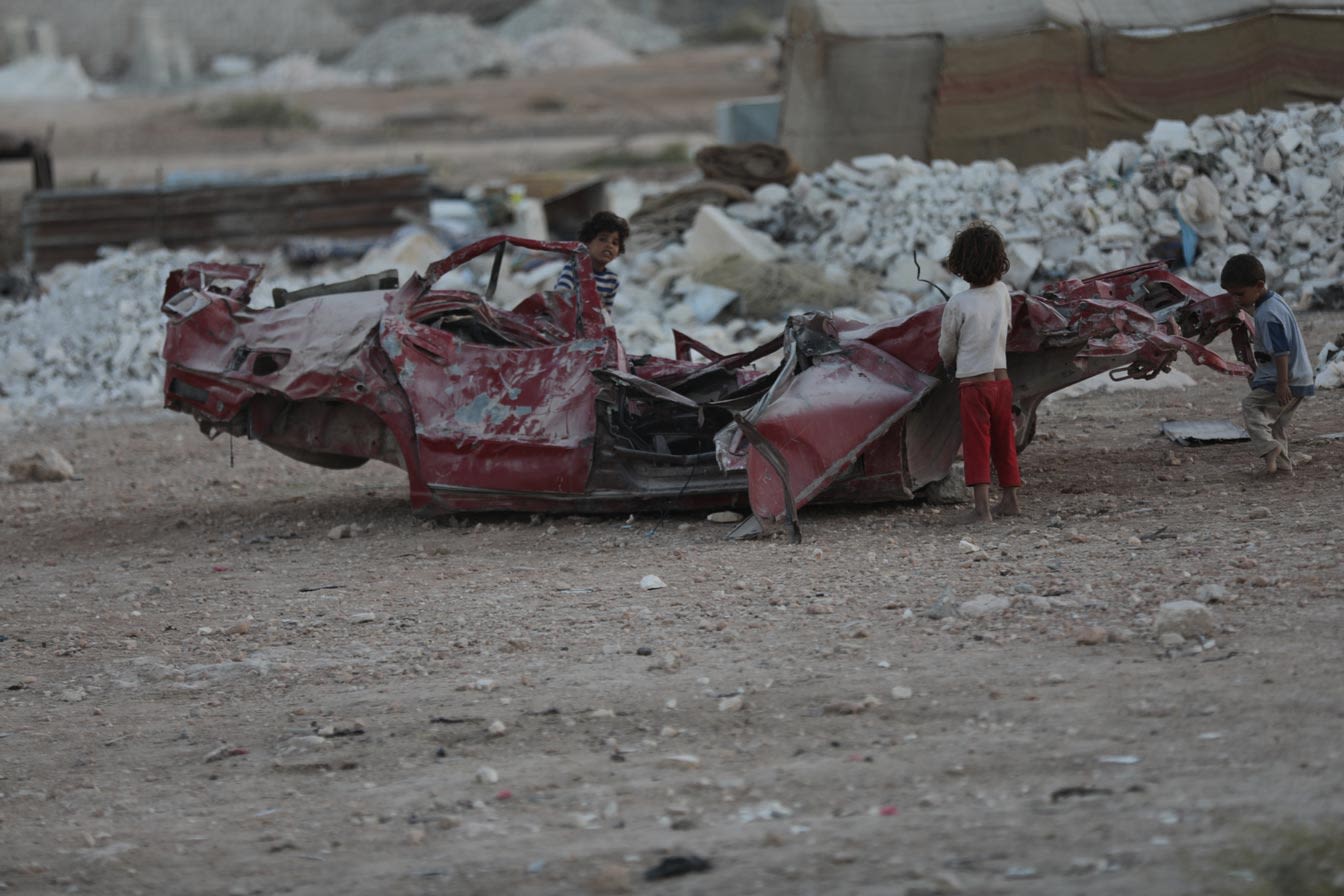
“Do you go to school?” we asked the kids knowing the answer in advance. “No, we haven’t gone to school since we moved into this place,” they replied.
“The reason lies in the lack of schools nearby.”
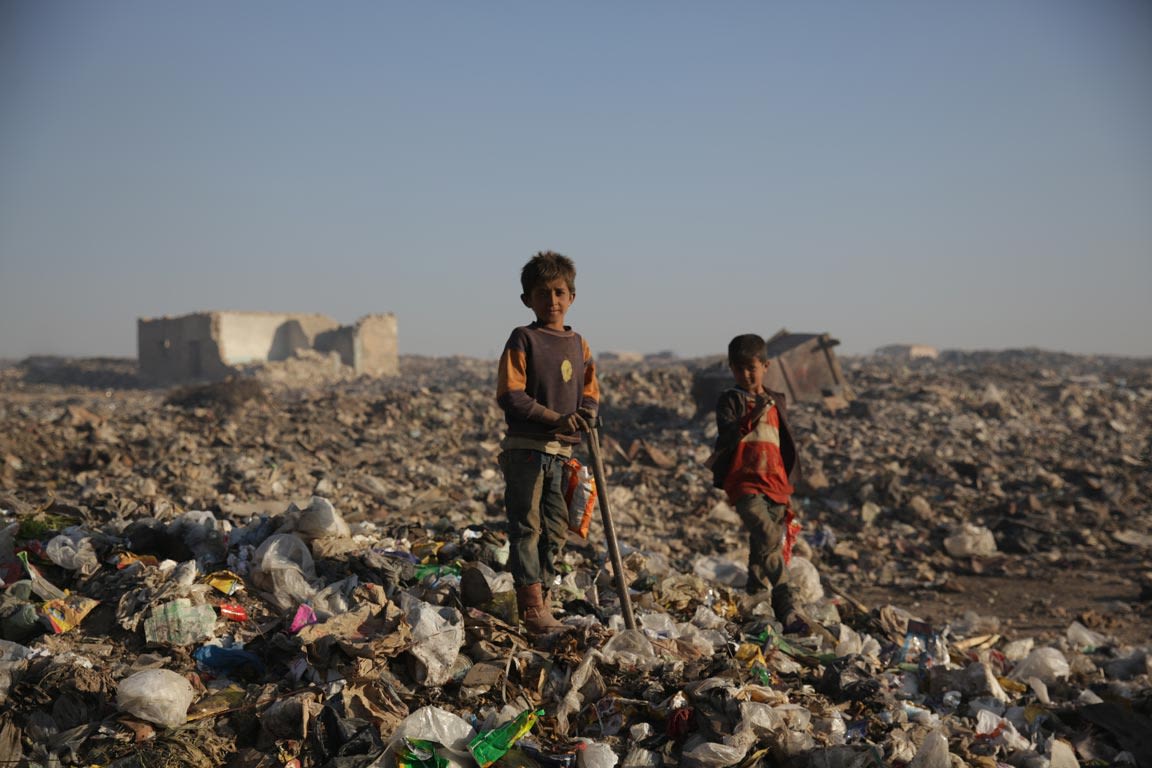
Sa’eed/ 10-year
Sa’eed/ 10-year
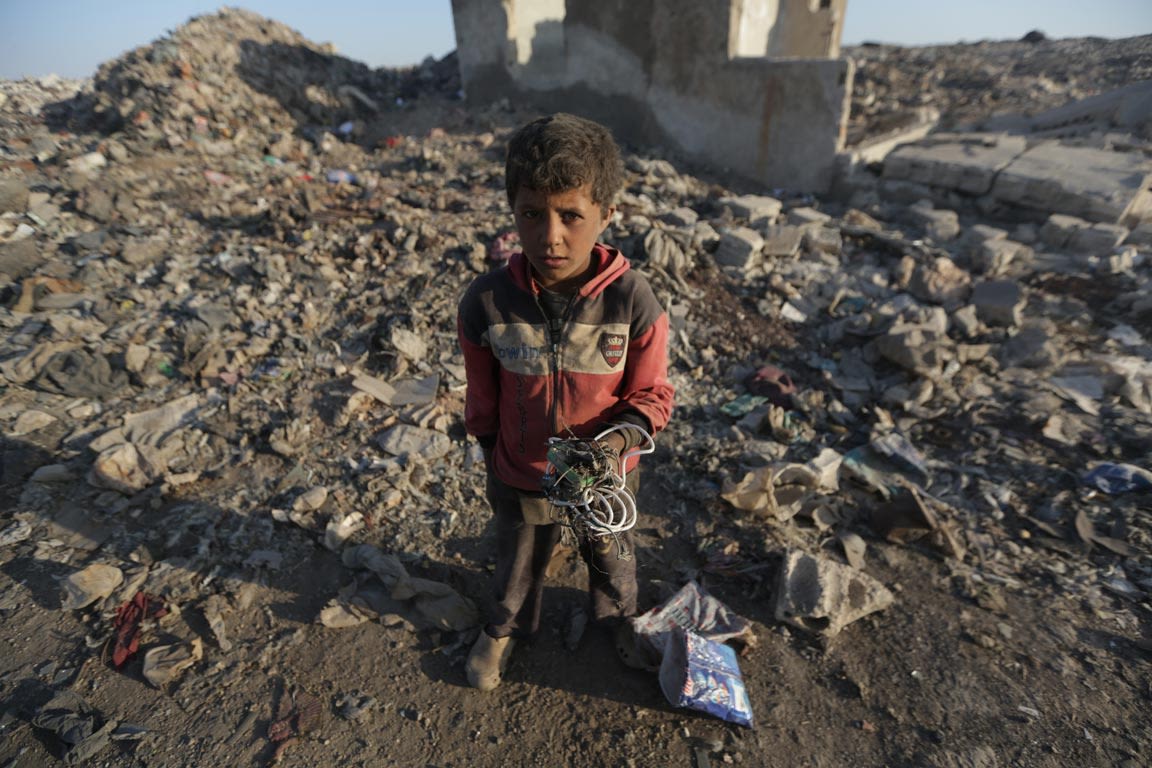
Ahmed/ 8-year
Ahmed/ 8-year
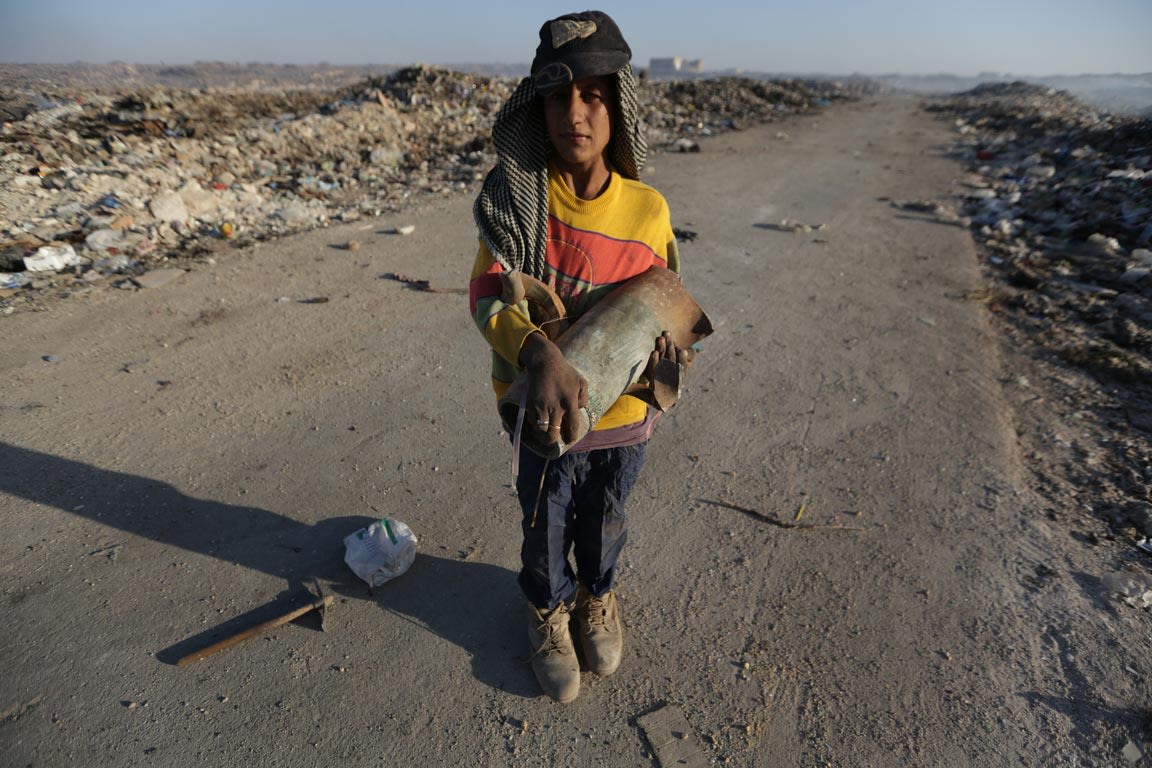
Ali/ 12-year
Ali/ 12-year
Not only are the kids present in the dump
but also sheep can be seen here digging into the garbage piles for food
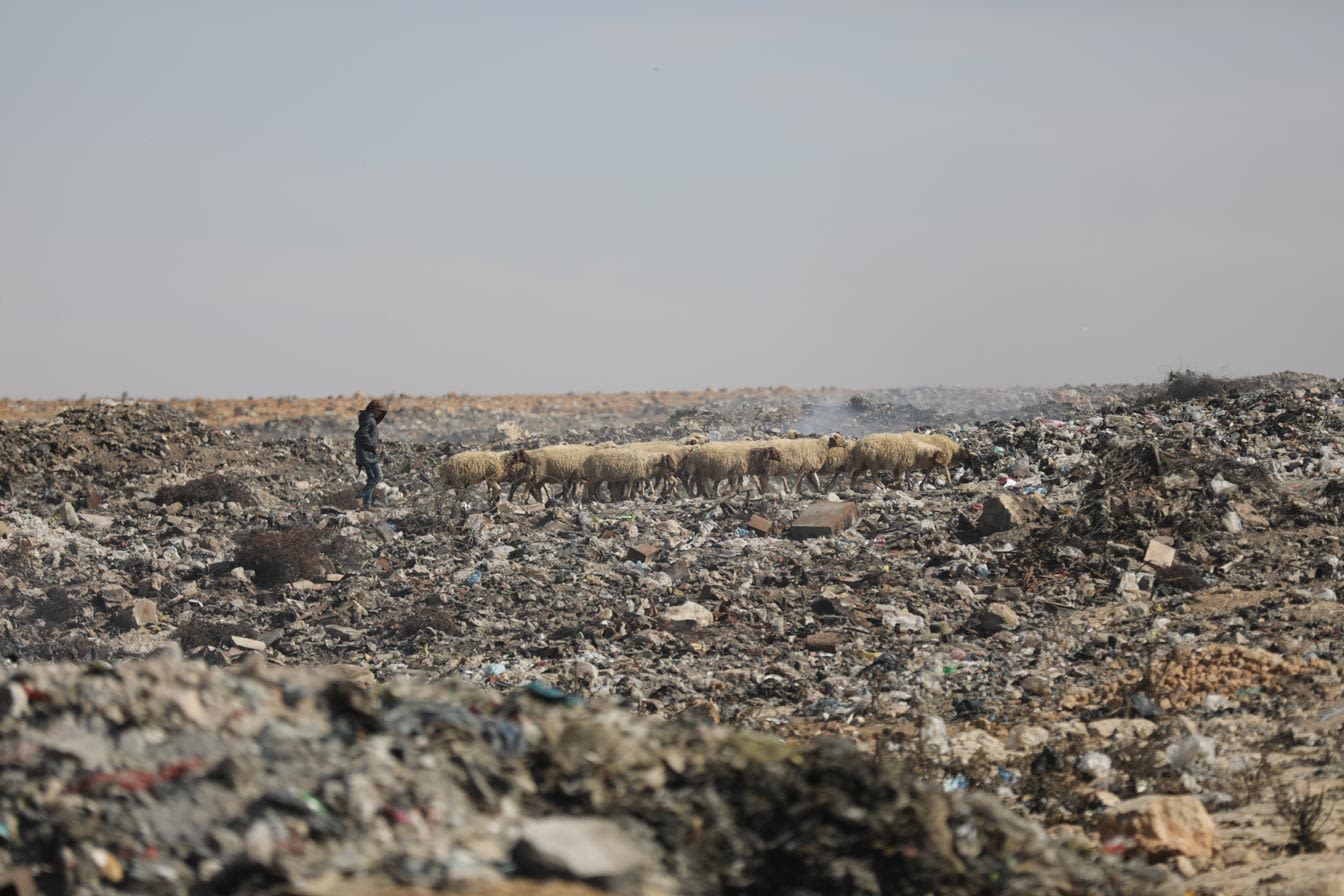
Sheep are welcome to get into the place; but, strangers are not
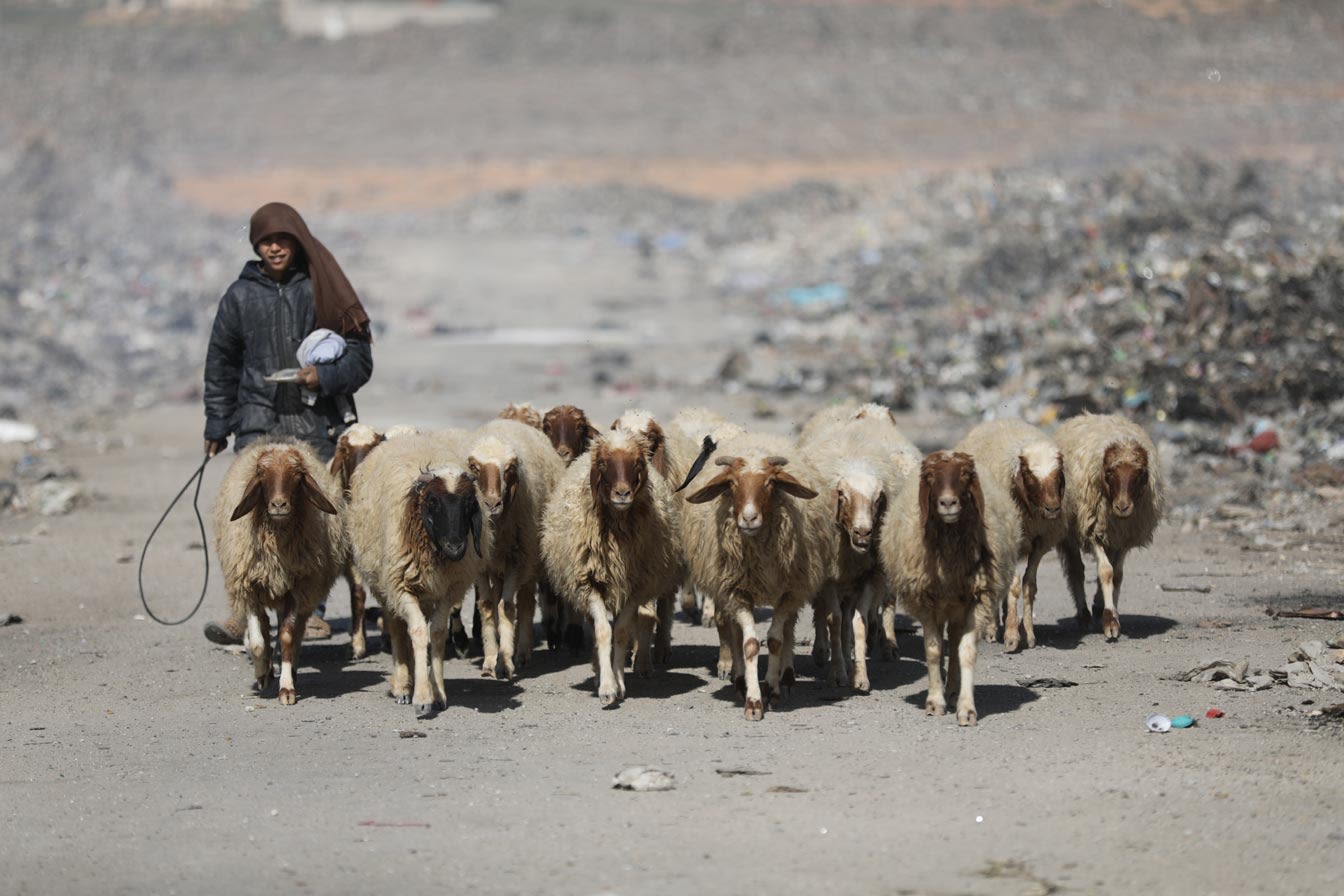
Rules governing work in the landfill are as follows
After spending a day with Sa’eed, we surely realized everything is going according to a plan.
Nothing here occurs at random; probably work is the only organized activity going on amid the piles of garbage and the randomly-erected tents scattered everywhere around the area.
Landfill laborers reported the following rules to be governing work there:
- No outsiders allowed! Only residents from the area are allowed to work at the landfill.
- Early birds are given the privilege of searching everywhere they want.
- No certificate of good behavior is required to apply to work at the landfill. No instance of dispute between workers has ever been reported.
- Family heads supervise the work. Each family has a person responsible for managing their work.
- Overpricing is prohibited. All workers made a list of the prices of all saleable items they could find. No one sells below the market (i.e., offers prices lower than their colleagues) to negatively affect the market.
- The larger the quantity of copper and aluminum a worker can find, the more competent he becomes.
- Wearing a piece of cloth on the face is optional rather than mandatory. Sa’eed refused to have his face covered with it and accounted for this preference.
Why do workers put pieces of cloth on their faces?
Either black, red or green — the color of the cloth makes no difference and it is often cut off from old clothes turned into a face mask.
Wearing such a piece of cloth is a preventive measure to protect kids against leishmaniasis and the bites of sand flies, small blood-sucking insects.
Asked why he refuses to wear a piece of cloth on his face, Sa’eed replied that it prevents him from exchanging some chitchat with his coworkers and that he is not afraid of the sand fly’s bites.
A bite from this insect produces a cutaneous ulcer. The infection is also known as Aleppo Boil, Baghdad Boil, or Jericho Boil and its medical term is leishmaniasis. It is the chief enemy of both the landfill workers and the residents living nearby. The insect grows in dumps and open sewage.
Al-Bab Health Center, the nearest health facility to the landfill, receives around 30 biting cases on a daily basis.
The symptoms of such a cutaneous disease usually appear weeks after the person is bitten, in the form of small and big red spots and ulcers on the skin which usually grow larger and take a very long time to heal leaving behind a disfiguring scar or lesion.
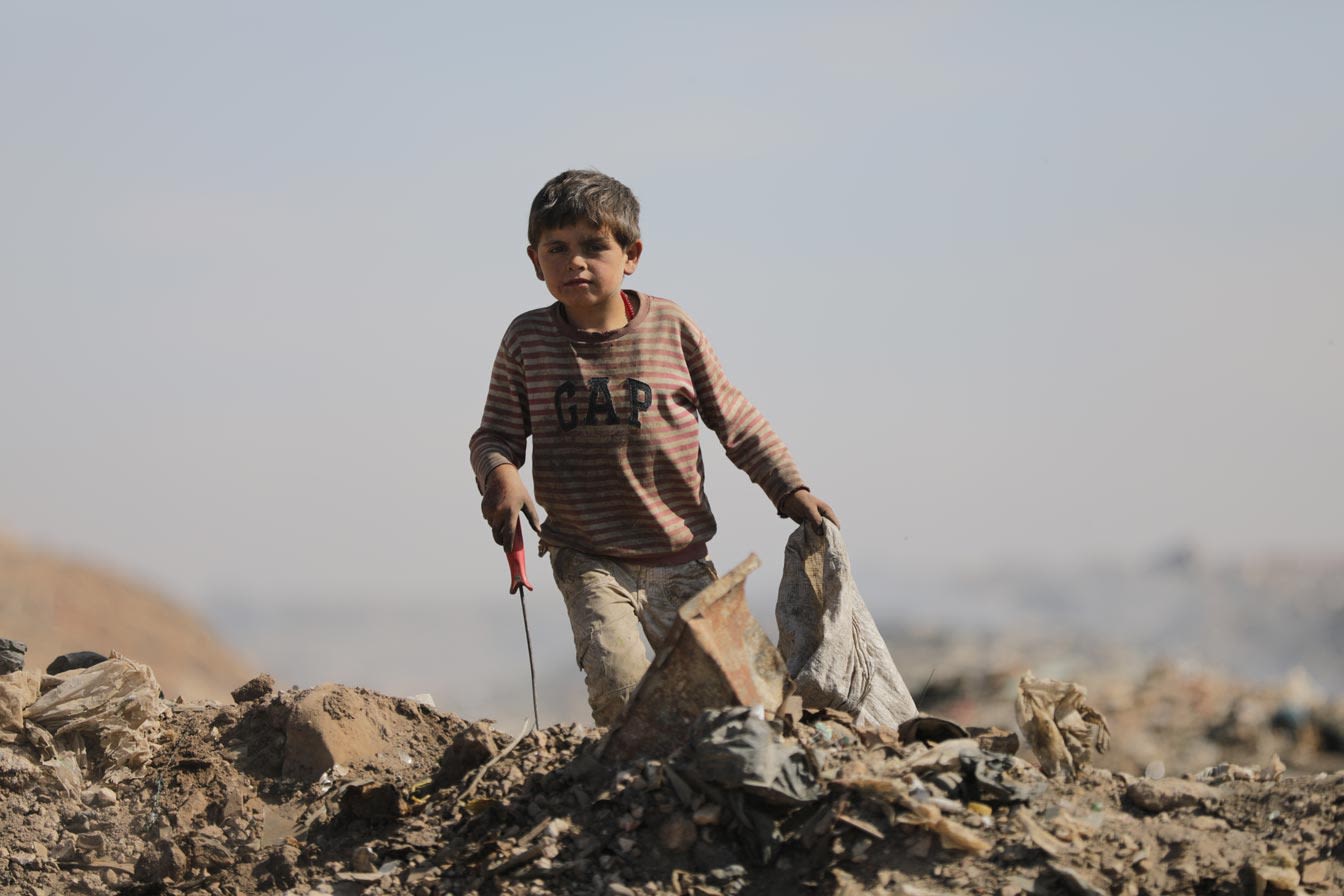
According to the World Health Organization, over 40,000 new instances of leishmaniasis infection are reported annually in Idlib, north Hama, and rural Aleppo alone, making this one of the worst-affected areas in Syria.
A Red Cross spokeswoman pointed out that the cases of leishmaniasis in Syria in 2017 exceeded 150,000, more than 50,000 of which were detected in Aleppo alone.
In 2019, with financial support from the United States Agency for International Development (USAID), WHO and its partner implemented one of the first large-scale leishmaniasis prevention, control and treatment projects reaching approximately 1.25 million people in north-western parts of Syria.
The infliction did not prevent residents there from working at the landfill because, as one of them emphasized, “money talks.”
Cases of leishmaniasis in Syria increased by 30 percent as a result of displacement and destruction
Now comes the time for a break
It is time for lunch
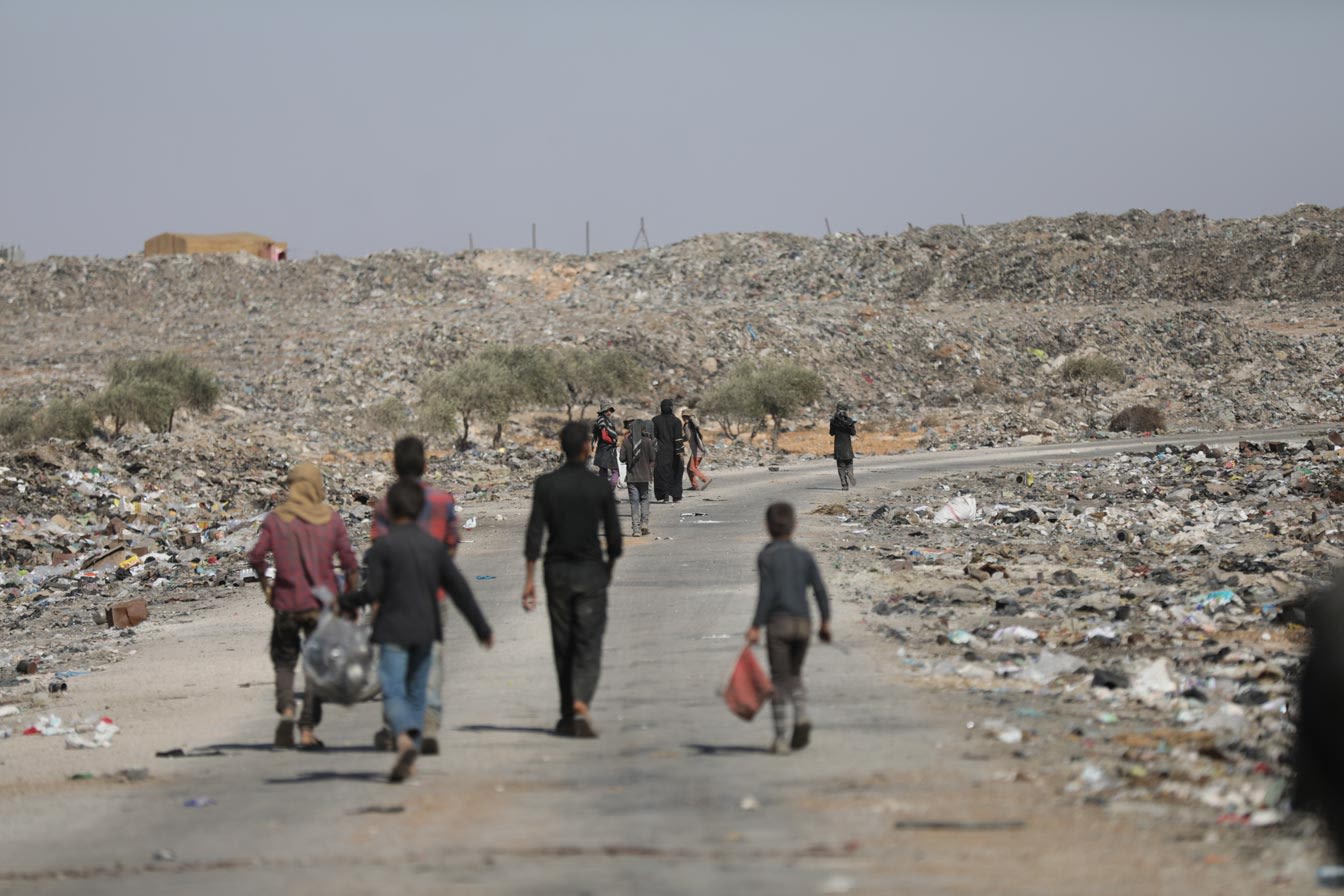
Break time is probably the only time throughout the day during which the workers take the piece of cloth off their faces to have lunch.
We accompanied Sa’eed into his tent.
He went inside and came out carrying in his hand bread wrapped up in a plastic bag.
Workers eat bread — actually much bread all day long — to be able to satisfy hunger.
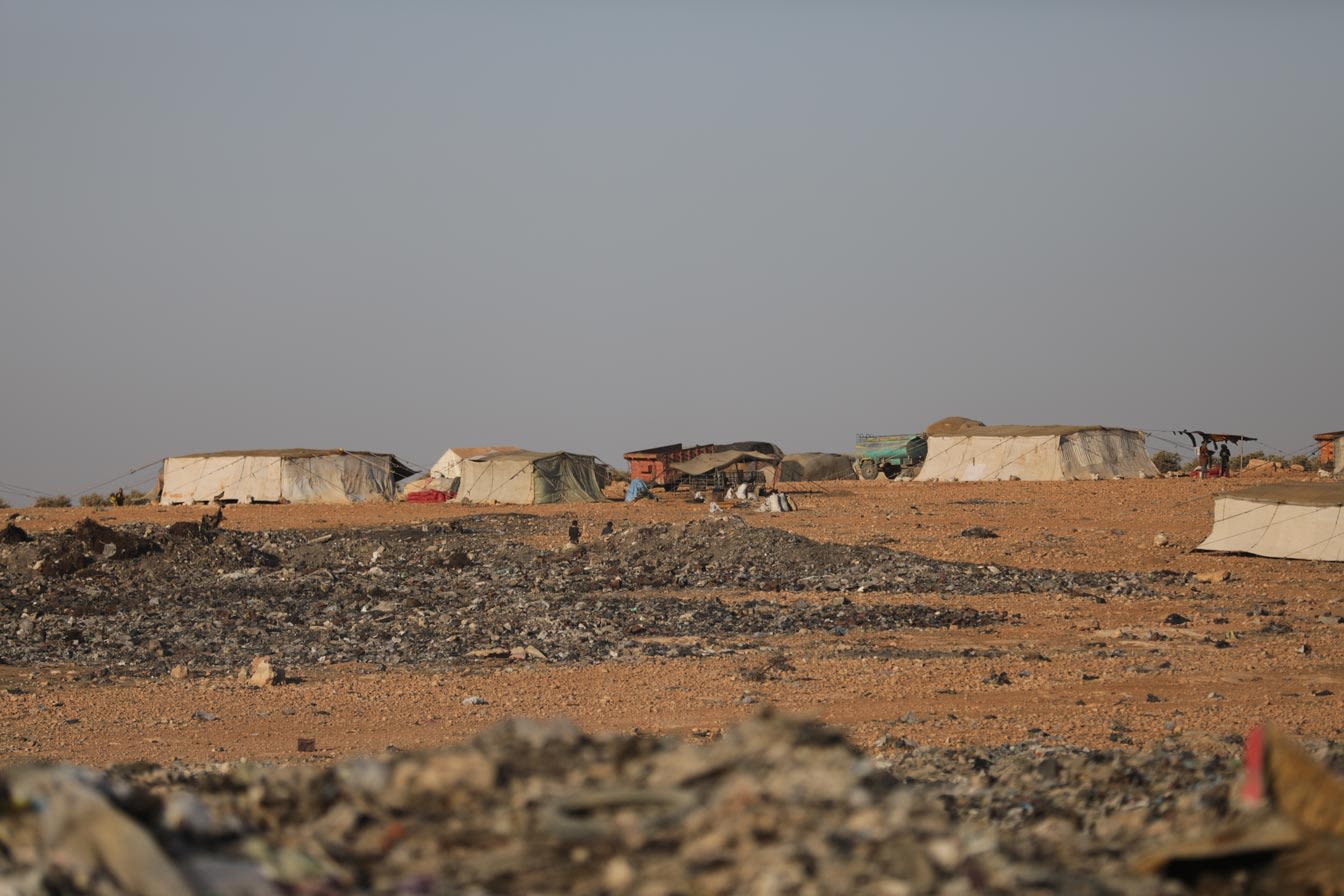
Smoke hazes hang over every corner of the landfill as a result of the burning fires.
But do not be fooled by such smoke; because it indicates no cooking being done over there.
Smoke billows into air as a result of burning garbage or for heating purposes.
Lighting fire is of special importance specially that the tents are supplied with neither electricity nor water.
“My father makes our family’s necessary purchases from Al-Bab market once per month,” Sa’eed said.
Sa’eed finished eating his bread so quickly; then, he carried the iron device he uses in digging and resumed work as the sun was about to sink below the horizon.
Now, after a long day of hard work
The first car which buys the kids’ saleable items arrived at the landfill at sunset.
The driver started to call the kids over to gather around the car using a loud speaker so that they could sell the items they found during the day.
Ahmed, the 35-year-old driver, regularly shows up at the landfill coming from rural Idlib to buy the kids’ “goods”.
“Kids often find aluminum cans, batteries, plastic pieces, copper, and stale bread,” Ahmed explained.
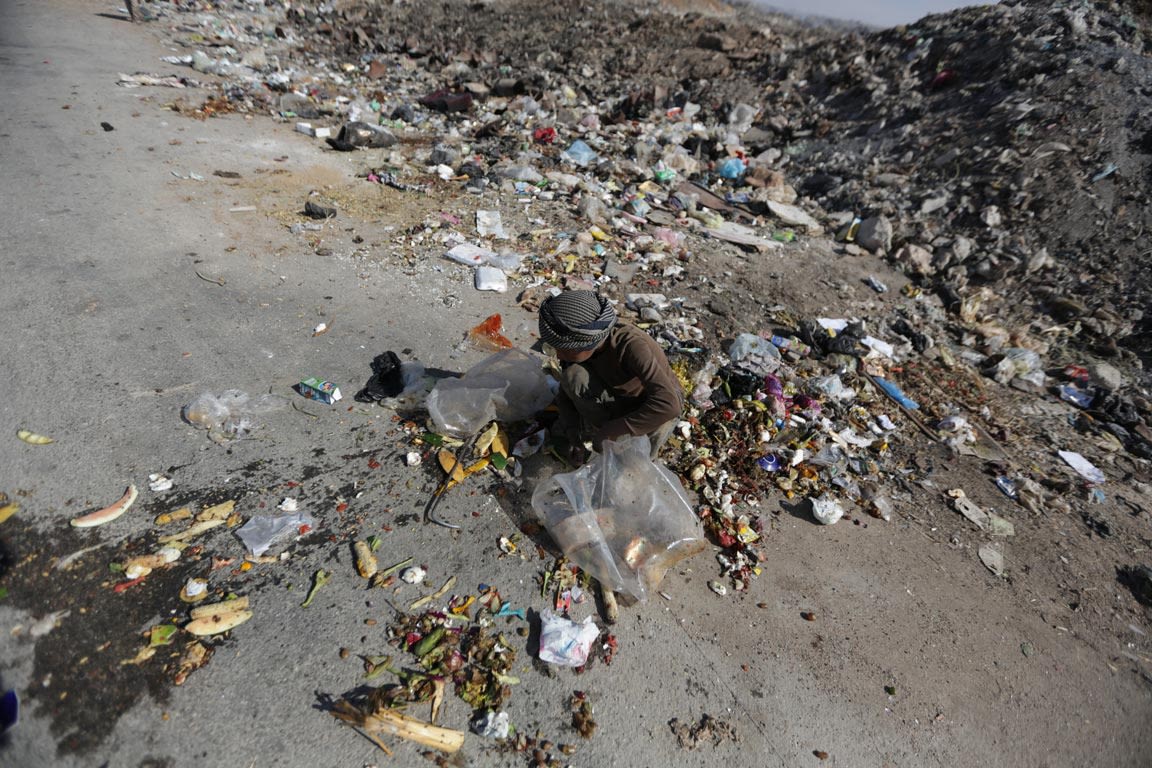
He buys one kilo of plastics for SYP130 (equal to a few pennies); one kilo of copper for SYP3500 (equal to USD12); and one kilo of stale bread for SYP100.
Sa’eed was luckier than other workers who could not find something suitable for selling.
After he buys the items kids find, Ahmed, in turn, sells metals to an Idlib-based foundry and stale bread to animal feed stores.
Sa’eed sold his items at SYP500 that day; that is, less than $2, yet, he is still luckier than many other workers who could find nothing at all.
Working as a landfill worker tests patience. A worker may end up a whole day without finding any saleable article; and in this case, he returns to his tent feeling disappointment yet hoping the next day he will be luckier.
Experiencing such setbacks does not discourage a worker from proceeding with digging for the valuable items amid the valueless garbage.
Before saying goodbye to Sa’eed, we asked him: “what do you wish to be when you grow up?” “I wish we have a house of our own,” he replied concisely.
